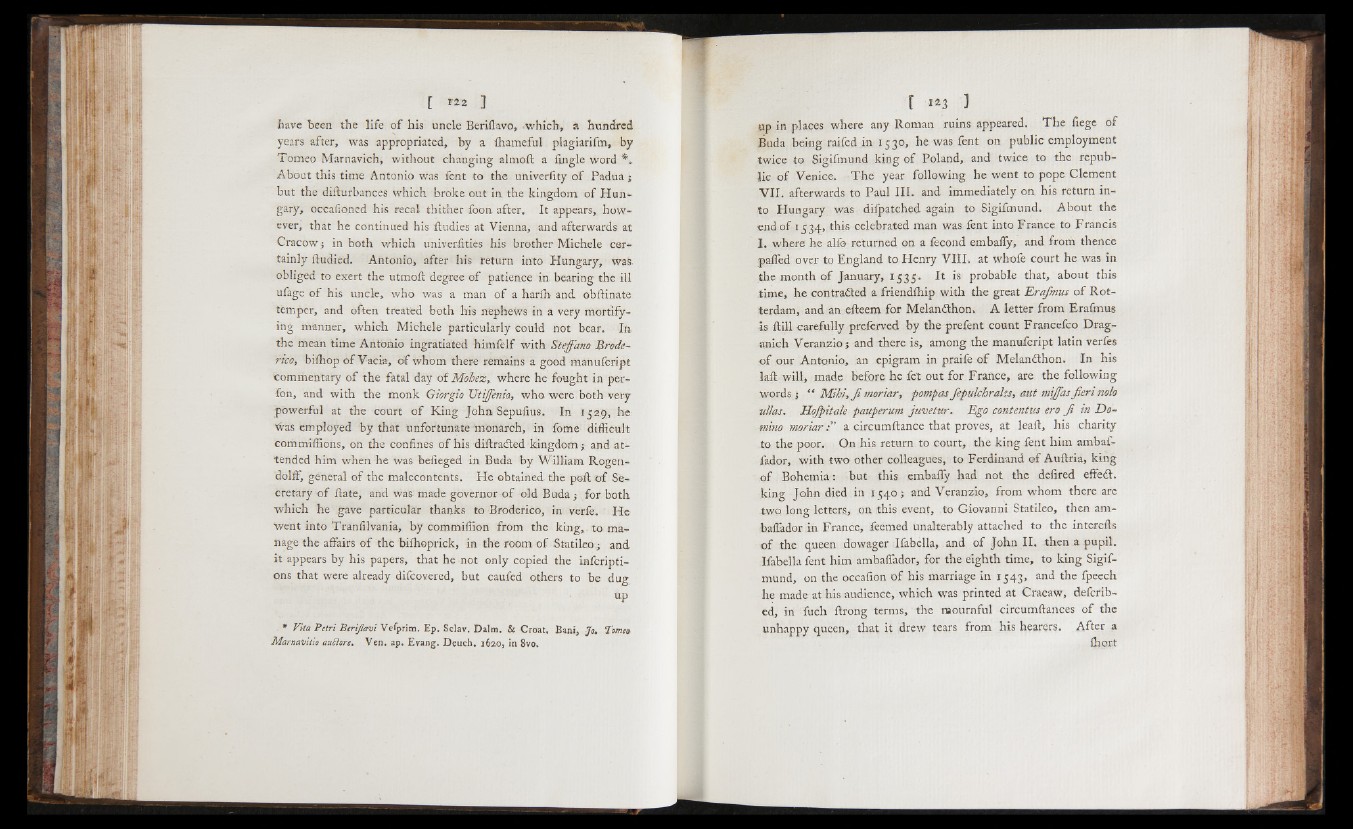
have been the life o f his uncle Beriflavo, -which, a hundred
years after, was appropriated, by a fhameful plagiarifm, by
Tomeo Marnavich, without changing almoft a fingle word *.
About this time Antonio was fent to the univerfity of Padua;
but the difturbances which broke out in the kingdom o f Hungary,
occafioned his recal- thither foon after. It appears, however,
that he continued his Rudies at Vienna, and afterwards at
Cracow; in both which univerfities his brother Michele certainly
Rudied. Antonio, after his return into Hungary, was.
obliged to exert the utmoR degree of patience in bearing the ill
ufage o f his uncle, who was a man o f a harih and obitinate
temper, and often treated both his nephews in a very mortifying
manner, which Michele particularly could not bear. In
the mean time Antonio ingratiated himfelf with Steffano Brode-
rico, bifhop of Vacia, o f whom there remains a good manufcript
commentary o f the fatal day o f Mo'heis,. where he fought in per-
fon, and with the monk Giorgio Utijfenia, who were both very
powerful at the court o f King John Sepufius. In 1529, he
Vvas employed by that unfortunate monarch, in fome difficult
commiffions, on the confines o f his diftraded kingdom ; and attended
him when he was befieged in Buda by William Rogen-
dolffi, general o f the malecontents. He obtained the poR o f Secretary
o f Rate, and was made governor o f old Buda; for both
which he gave particular thanks to Broderico, in verfe. He
went into Tranfilvania, by commiffion from the king, to manage
the affairs o f the bilhoprick, in the room o f Statileo ; and
it appears by his papers, that he not only copied the infcripti-
ons that were already difcovered, but caufed others to be dug
up
* Vita Petri Berijlavi Velprim. Ep. Sclav. Dalm. & Croat. Bani, Jtu Trneo
Marnavitio auliore. Ven. ap. Evang. Deuch. 1620, in 8vo.
up in places where any Roman ruins appeared. The fiege o f
Buda being raifed in 1530, he was fent on public employment
twice to Sigifmund king o f Poland, and twice to the republic
o f Venice. The year following he went to pope Clement
V I I . afterwards to Paul III. and immediately on his return into
Hungary was difpatched again to Sigifmund. About the
end o f 1534, this celebrated man was fent into France to Francis
I. where he alfo returned on a fecond embafTy, and from thence
palled over to England to Henry VIII. at whofe court he was in
the month of January, 1535. It is probable that, about this
time, he contradted a friendfhip with the great Erafmus o f Rotterdam,
and an efleem for Melandthon. A letter from Erafmus
is Rill carefully preferved by the prefent count Francefco Drag-
anich Veranzio; and there is, among the manufcript latin verfes
o f our Antonio, an epigram in praife o f Melandthon. In his
laR will, made before he fet out for France, are the following
words 3 “ Mihi, f i moriar, pompas Jipulchrales, aut mijfas fie ri nolo
ullas. Hofpitale pauperum juvetur. Ego contentus ero J i in Domino
moriar:' a circumRance that proves, at leaR, his charity
to the poor. On his return to court, the king fent him ambaf-
fador, with two other colleagues, to Ferdinand of AuRria, king
o f Bohemia: but this embafTy had not the defired effedt.
king John died in 1 440; and Veranzio, from whom there are
two long letters., on this event, to Giovanni Statileo, then am-
bafiador in France, feemed unalterably attached to the intereRs
o f the queen dowager Ifabella, and o f John II. then a pupil.
Ifabella fent him ambaflador, for the eighth time, to king Sigifmund,
on the occafion o f his marriage in 1543, and the fpeech
he made at his audience, which was printed at Gracaw, defcrib-
ed, in fuch Rrong terms, the mournful circumRances o f the
unhappy queen, that it drew tears from his hearers. After a
ihort